Belief in God: Is the ‘New Atheism’ Influencing Australians?
Monday, 2 April 2012
| Philip Hughes
The idea of God has certainly become contentious in contemporary Australia. In 1949, there was little disagreement: a Gallup Poll reported that 95 per cent of Australians believed in God. Today, Australians hold a variety of views. The 2009 Survey of Australian Attitudes conducted by the Australian National University among 1718 adult Australians found that just under half the population (47%) believed in God. Among that 47 per cent, there was considerable variation in the levels of confidence. Just 25 per cent of the Australian population said they had no doubts that God exists. The remaining 22 per cent were somewhat tentative in their belief. Some said they had doubts, but generally believed. Others said they believed some of the time but not at others.
There is also a variety of attitudes among those who do not believe in God. Not all are atheists. Indeed, just 16 per cent of Australians said they believed there was no God or higher power. Another 15 per cent say they do not know whether there was a God. An additional 20 per cent said they did not believe there was a personal God, but they did believe there was a higher power.
While 60 per cent of Australians said they had not changed their belief in or rejection of God, another 20 per cent had changed what they believed and another 20 per cent were not sure if they had changed or not:
ñ 21% said they don’t believe in God now and never have;
ñ 16% say they don’t believe in God, but used to;
ñ 4% say they believe in God now, but didn’t used to;
ñ 39% say they believe in God and always have; and
ñ 20% said they could not choose or did not answer the question.
In other words, for every person who had moved from not believing to believing in God, four Australians had moved in the opposite direction.
It would be interesting to know if those who could not choose were vacillating, or whether the issue was simply not important to them.
Variations in Belief in the Australian Population
There are some significant patterns in belief across the population. As shown in Figure 1, many more older people than younger people believed in God. Among those aged over 80, nearly half believes in God and have no doubts. Among those people in their 60s and 70s, it was close to one-third of the population. Among those aged 31 to 60, it was approximately one-quarter of the population. Among those aged under 30, only 14 per cent said they believed in God without doubts.
The picture of belief in God by age group is probably more descriptive of historical change in Australian society than life-cycle differences. Thus, the patterns suggest the decline of belief may continue.
We do not have recent accurate information about the beliefs of teenagers in Australia as a whole. However, in CRA surveys of 4000 students in 29 Catholic schools, we have found levels of belief in God more similar to adults in their 30s rather than young people in 20s. Thus, 44 per cent of students in secondary Catholic schools have indicated that they believe in God, 24 per cent say there is some sort of spirit or life force, 22 per cent do not really know what to think, and 10 per cent say they do not think there is any sort of spirit, God or life force.
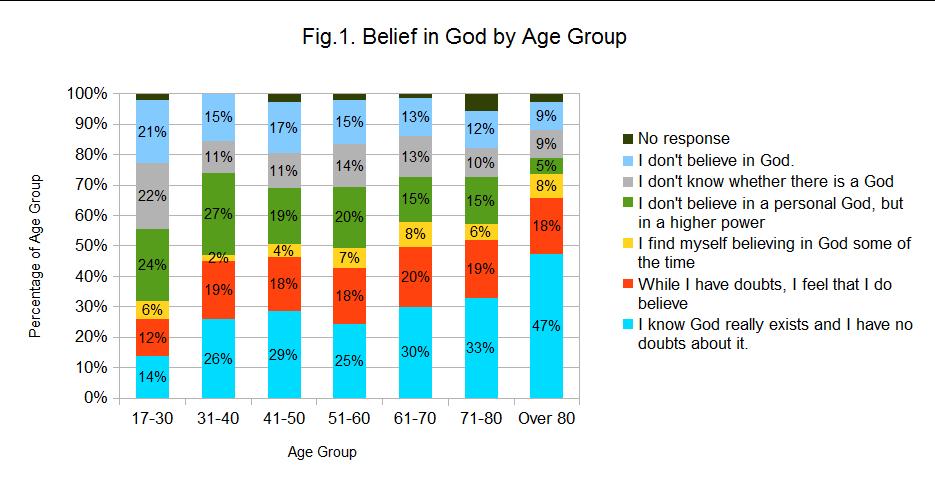
As previous research has indicated, the decline of belief in God has been partially offset by the increased proportion who believe in a higher power (Hughes 2010, p.4). This is a position held by very few people aged over 80, but has become a common position of more than 20 per cent of the population among those under 60.
Figure 2 shows that smaller proportions of Australians with university degrees, certificates and diplomas believed in God than Australians with lower levels of education. However, if one takes age into account, education made little difference. Many of those who had not reached year 12 in their education were older people, and more of them believed in God.
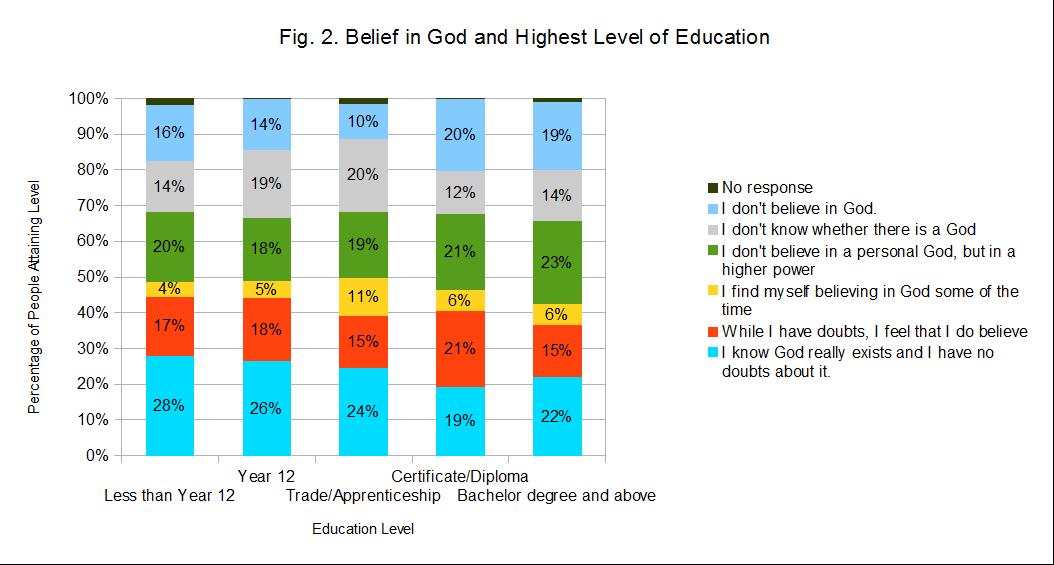
What made a much greater difference in levels of belief was the community and culture into which the person was born. Among people born overseas, almost twice as many believed in God without doubts as among people born in Australia (Figure 3). On the other hand, just as many born overseas rejected belief in God altogether (16%). The major difference was that few people born overseas believed in a higher power. And if they did believe in God, they believed without doubts. Many immigrants come from cultures where belief or the rejection of belief is not widely questioned and what is learned in childhood is accepted. In Communist and post-Communist countries, the rejection of God has been the orthodox position. In other countries, such as the Pacific Islands and the Philippines, children have been taught to simply accept the existence of God.
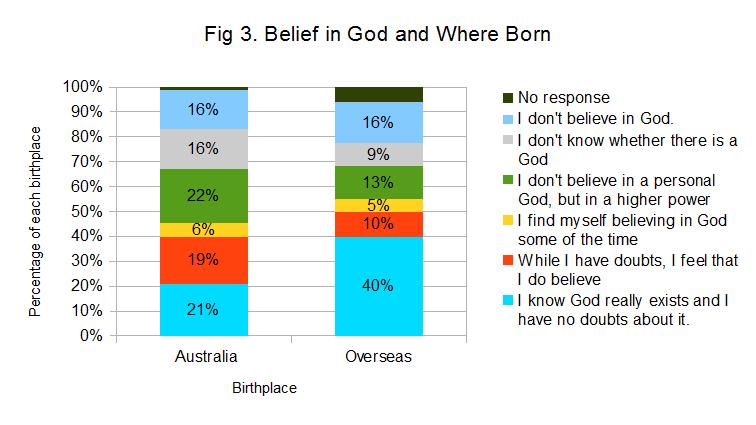
There was a significant difference in the levels of belief in God among males and females (Figure 4). The difference was much greater among older Australians than younger Australians. For Australians in their 30s, there was no difference with 26 per cent of males and females believing in God without doubt. But for Australians in their 70s, there was a large difference with 28 per cent of males and 39 per cent of females believing in God without doubt.
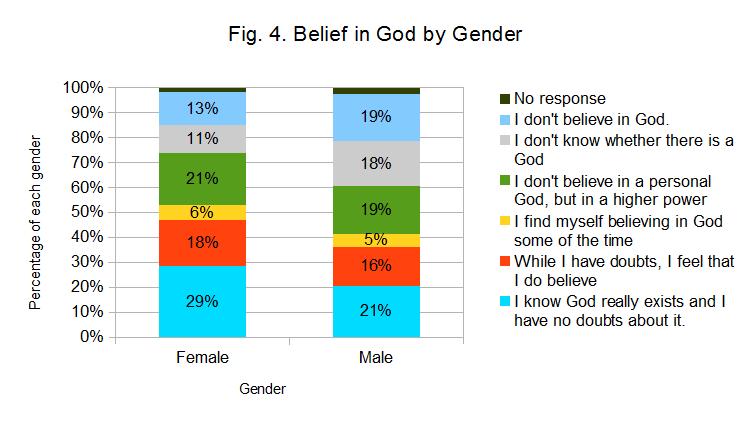
There was also considerable difference in the levels of belief in God in different occupational groups (Figure 5). The lowest levels of belief were found among professionals. Low levels of belief were also apparent among technicians and those in trades and machine operators and labourers. Higher levels of belief were found among managers, those involved in community and personal service, sales and clerical and administrative work.
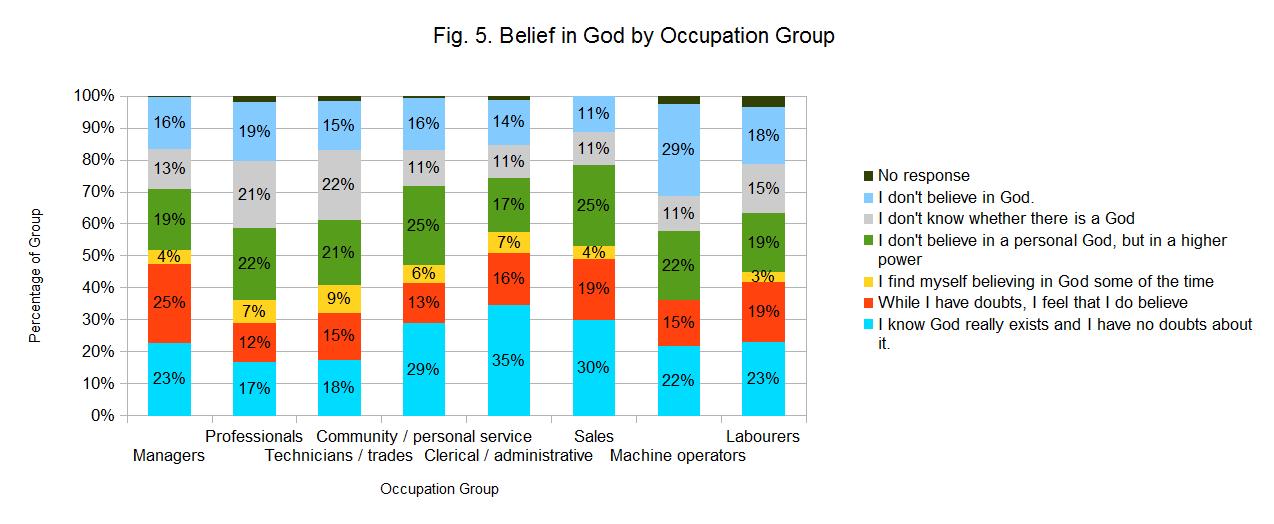
Previous research has suggested several reasons for these differences. One is the link between religious interests and particular values. In general, churches have encouraged people to move into people-oriented occupations, partly because of the role that churches have in health, community welfare and education. Hence, more people in such occupations have a church background. There is also some evidence that people who think in technical and concrete ways are less likely to place importance on abstract or religious values (Hughes, 2009, pp.15-16).
Why Have People Changed?
Have the ‘New Atheists’ been a significant part of the story of change in belief in God? There are several reasons to believe they have not had much impact. The first is that there has been a relatively even decline in belief since 1993, well before they began their campaigns. The only piece of evidence which might suggest that the decline has become more rapid in recent years has been the sharp decline in belief in God among young people shown in Figure 1.
The CRA has carefully examined the attitudes of 9000 students attending Catholic schools. There has been a decrease of just 2 per cent in belief in God between 2005 and 2011. While this would fit the picture of a gradual decline, it does not suggest a sharp decline in recent years.
Further evidence for the lack of impact of ‘New Atheism’ is the fact that many of those who have given up belief in God have not adopted atheism as their stance, but indicate they believe now in some sort of higher power or life force. Atheism has increased over recent years, but only slightly. Among the matched samples of students in Catholic schools, the proportion rejecting any kind of God, spirit or life-force rose from 9 per cent in 2005 to 10 per cent in 2011.
The 2009 Australian Survey of Social Attitudes allows us to look at the impact of a range of factors influencing belief in God. Regression analysis, which compares the individual significance of a wide variety of factors, shows that the factors such as gender, age, level of education were not significant when one considered other factors such as those listed in Table 1.
Table 1. Factors Significant in Belief in God
|
Factor
|
Standardized Beta Coefficient*
|
Significance Level#
|
|
How often one prays
|
0.478
|
0.000
|
|
One's confidence in the churches and religious organisations
|
0.209
|
0.000
|
|
Belief there is too much trust in science
|
0.157
|
0.000
|
|
One's attendance at church as a child aged 11 or 12
|
0.105
|
0.000
|
|
Rejection of the idea that religions bring conflict
|
0.039
|
0.027
|
* These coefficients are measures of the strength of the relationship between the factor and belief in God: the higher the coefficient, the stronger the relationship.
# The signficance level shows that the level of chance that the relationship would be found in the total population. A figure of less than 0.05 indicates that there is a better than 95% chace of this relationship being present in the wider population.
Belief in God was strongest and most confident amongst those who prayed frequently and those who had high levels of confidence in the religious organisations. Another significant factor was the level of trust in science: those with less confidence in science were more likely to affirm belief in God. Having attended church as a child also made a significant difference. Finally, the link that people made between religious faith and conflict was significant. Together these factors accounted for about 60 per cent of the variance in confidence in belief in God.
In terms of the lack of confidence in the existence of God, the data suggests that this is related to:
ñ the decline in frequency of personal prayer;
ñ lack of confidence in the churches and religious organisations;
ñ trust in science;
ñ lack of attendance at church as a child; and
ñ the belief that religions bring conflict.
The comparative strength of these factors is shown in Table 1 below. Each of them is worthy of further reflection.
Prayer
For many Australians, the notion of God has simply faded as they have discontinued practices such as prayer. Most people discuss their lives and everyday events without reference to God. The question of whether God exists is simply not a question most Australians think much about, just as prayer is not a common practice for many Australians. Most Australians never have to decide or declare whether they believe in God or not.
What has been evident in our recent surveys of school students is that there has been more of a decline in prayer than in belief in God. In 2005, 28 per cent of students said they prayed often. By 2011, this had fallen to 23 per cent of students. It is an indication that students are less frequently referring to God or thinking about God in the context of their daily lives.
Decline in confidence in the churches
The decline of confidence in the churches has contributed to the lack of confidence in God. A recent study by Olive Tree Media (2011) suggested that the three major ‘belief blockers’ were:
ñ church abuse
ñ hypocrisy
ñ judging others.
These are all factors which have contributed to the decline in confidence in the churches, which has, in fact, led to a decline in belief in God. In interviews with young people, there have been a number of occasions in which they have referred to the fact that they feel that their behaviour and life-style is unacceptable to people in the churches. While they may not be able to point to a specific instance, some feel that they are ‘judged’ by people within the churches.
Science and religion
For many people, trust in science has also contributed to the decline in belief in God. Religion and science do not necessarily conflict. Many scientists believe in God. On the other hand, science does paint a rather different picture of the world than does religion. The fact that some people reject the general picture of evolution, for example, in the name of religion contributes to the sense that there is a conflict between religion and science. Just 16 per cent of Australian adults believe that we trust science too much.
Church attendance
God’s existence remains an issue for those who attend church frequently, but when people cease to attend, it becomes much less of an issue. More than half the population attended a church monthly or more often when they were children (for more details, see Hughes 2011, pp.19-20). However, of those who used to attend frequently:
ñ 35% never attend
ñ 37% attend occasionally, and
ñ 28% now attend monthly or more often.
In other words, 72 per cent of those who attended church as children have decreased their attendance, with about half of those people now never attending. Without the on-going support of a community of people who believe, or on-going reminders of what ‘God’ might mean for life, the question of God’s existence has simply faded. While some have ceased to attend church because they ceased to believe in God, many have ceased to attend for other reasons, and the notion of God has faded as a result (Bellamy et al. 2002, p.14). Nevertheless, attendance at church as a child remains a significant factor in belief in God. As the percentage of the population attending the church as a child falls quite rapidly, one can expect the proportion believing in God will continue to fall.
It is noteworthy that the relationship between church attendance and belief in God is far from a perfect correlation. Of those who attend church monthly or more often, just 75 per cent said they believed in God without doubts and 10 per cent did not indicate belief in God at all. Among those who never attended, 7 per cent said they believed in God without doubts, and 51 per cent did not believe in God at all.
Religion and conflict
Through the last decade, there have been many instances of religion lying at the heart of conflict. The so-called ‘war on terror’ has been seen as a war on people who were creating terror motivated by religion. Conflict in Northern Ireland, the Balkans, Nigeria, and in many other parts of the world has a religious component. From the perspective of many Australians, religion appears to be a contributor to conflict rather than a contributor to peace. This fact is contributing to the decline of confidence in religion in general, and belief in God in particular. Again, this finding is confirmed by the Olive Tree Media (2011) study which found that ‘religious war’ was a massive negative influence for 45 per cent of Australians and a significant negative influence for another 22 per cent.
Summary
The idea that belief in God is fading rather dropping suddently as the result of a dogmatic atheistic stance is supported by the fact that approximately half of all those who believe in God vacillate, believing sometimes and not at other times. It is easy to sit on the fence in regard to God in contemporary Australian society. In daily life, Australians do not often need to make decisions about whether they believe or not. In a culture in which few people pray or attend a church, the existence of God simply does not appear as an issue for most people.
The rejection of God is associated with the decline in confidence in the churches which has been fueled by cases of abuse and concerns about how such cases have been handled by church officials. It is also associated with the fact that people feel their behaviour and lifestyles are ‘judged’ by people within the churches. The rejection is also made possible by the alternative pictures of the world science provides in which there is no reference to God. The final factor is the association in the minds of many people between religion and war.
The Nature of God
The Biblical scholar, N. T. Wright, noted in one of his books that he often says to students who say they don’t believe in God, ‘What God do you not believe in?’. He notes that after hearing their reply, he would respond, “Well, I’m not surprised you don’t believe in that god. I don’t believe in that god either.” (Borg and Wright 1999, ch.10).
Many people would feel similarly about the notions of God described by the New Atheists, some of whom have very definite ideas about the God that they reject. Critics often note that these ‘straw gods’ bear little resemblance to the God in which they believe (see, for example, Frame (2009), p.212).
Little detail has been provided in recent surveys about perceptions of the nature of the God. However, a question was included in the Australian Survey of Social Attitudes about the extent to which people believed that God was concerned with human beings.
As shown in Fig. 6, the Australian population is widely divided on this issue. A little less than one third (28%) think God is concerned with human beings, a little more than a third (40%) think God is not, and close to one-third (32%) of Australians neither agreed nor disagreed or did not answer the question.
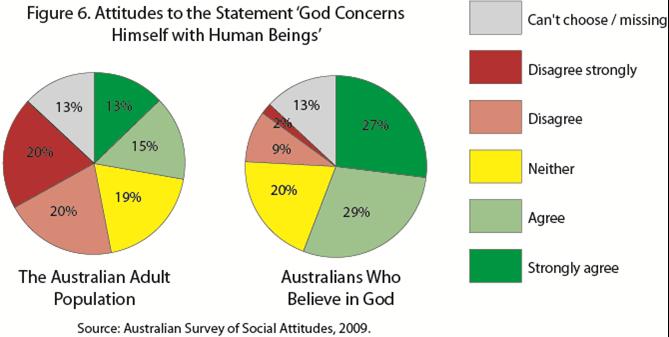
When we look at the attitudes of people who believe in God (including those who doubt or believe sometimes), we find that around 56 per cent think that God is concerned with human beings, but just 11 per cent think God is not.
The Australian Survey of Social Attitudes also asked whether people had their own way of connecting with God. While just over 40 per cent of the population said they did, one-quarter of the population did not, largely because of their rejection of the whole idea of God, and one-third of the population could not choose.
Among those who said they believed in God (at least sometimes), 56 per cent said they had their own way of connecting with God. This did not vary greatly across the age groups. It was affirmed by 57 per cent of those 70 years and older, and 52 per cent of young people who believed in God. So while there was a widespread affirmation of personal ways of thinking about God, there was no evidence of an increase in that individualistic way of thinking.
Among the younger people who do believe in God, there appears to be a strengthening of opinion that God is concerned with human beings. Overall, 27 per cent of those Australians who believed in God agreed strongly that God was concerned with human beings, but 38 per cent of young people under 30 who believed in God agreed strongly.
In a society in which, in parts, the sense that God exists is fading, there are signs that among young people who believe in God there is less questioning of God’s existence and the idea that God is concerned with human beings. They are also more likely than older people to reject the idea that they have their own connection with God.
It has often been observed that those Australians who believe in progressive forms of Christian faith tend to be older people. Raised in the traditions of faith, they continue to try to make sense of them. Younger people are more likely to either dismiss the Christian traditions altogether, or to embrace them strongly without question.
Conclusions
There is little evidence to suggest that the ‘New Atheism’ has had a measurable impact on Australians. There has been a decline in belief in God over several decades, and there is little sign that this decline has increased in recent years with the popularising of atheism by people such as Richard Dawkins. There remain similar levels of belief that there is ‘something beyond’ despite the new atheists contentions that there is nothing. Many of those who have turned away from belief in God continue to believe there is some sort of higher power.
For many Australians, the idea of God has simply faded into irrelevancy (Frame 2009, p.298). Most Australians do not think much about the question of God’s existence. It is not an issue which arises in everyday life. There are few private or public practices which keep the sense of God alive. Thus, the picture is not predominantly one of the dogmatic rejection of God, but rather a fading of the importance of thinking about the question. The question has no more significance for most Australians than the question ‘Is the Buddha Enlightened?’ When asked to respond in a survey, many indicate that they are unsure what to believe.
There are factors which are encouraging a culture in which the idea of God becomes contentious. The picture of the world provided by science, the association between religion and conflict and the perception of moral failure in the churches contribute to doubts.
All of this has important implications for Christian apologetics in contemporary Australia. Arguments with the ‘new atheists’ about the existence of God is likely to have little more impact than their arguments against God’s existence. However, the counter-arguments some denominations are highlighting (see, for example, the website of the Anglican Diocese of Melbourne) is probably an encouragement to some Christians in maintaining their belief.
A bigger issue for most Australians is whether one needs to believe in God: whether God can make a difference to one’s life. The experiential approach that the Pentecostals have embraced is most likely to have an impact among young people today. If God can transform lives that are dysfunctional, then God is worth believing in! In our post-modern, post-traditional world, the personal stories of other trusted people counts for much.
While the ‘new atheism’ is having little measurable impact across the population, it has probably contributed to a culture in which it is assumed that belief in God is not necessary and even a little ‘unusual’. It may also offer a hard and protective shell for the increasing numbers who feel that the issue is not worth thinking about.
Philip Hughes
References:
Bellamy, J., A. Black, K. Castle, P. Hughes and P. Kaldor (2002) Why People Don’t Go to Church, Openbook, Adelaide.
Borg, Marcus J. and N.T. Wright (1999) The Meaning of Jesus: Two Visions, Harper Collins, USA.
Blackford, Russell, ‘Best of 2011: Atheists Against The New Atheism’, ABC Religion and Ethics. http://www.abc.net.au/religion/articles/2012/01/16/3202269.htm (Accessed 19-01-2012).
Frame, T. (2009) Losing My Religion: Unbelief in Australia, UNSW Press, Sydney.
Hughes, P. (2009) ‘Religion and Occupation’, Pointers, vol. 19-1. March 2009.
Hughes, P. (2010) ‘Are Australians ‘Losing their Religion’?’ Pointers, Vol.20-2, June 2010.
Hughes, P. (2011) ‘Dropping out of Church’, Pointers, Vol. 21-4, December 2011.
Olive Tree Media, 2011, Australian Communities Report: Summary, http://www.olivetreemedia.com.au/resources/Olive%20Tree%20Media/Apologetics%20Series/Reseach%20Summary-web.pdf
Data source: Evans, A. (2009) The Australian Survey of Social Attitudes, (computer file), Australian Social Science Data Archives, Canberra.
This article has been reproduced from Pointers Vol. 22, no.1, March 2012. Individual copies of Pointers may be purchased from the CRA website for $6 and annual subscriptions for $20.
Go to https://www.cra.org.au/products-page/pointers/